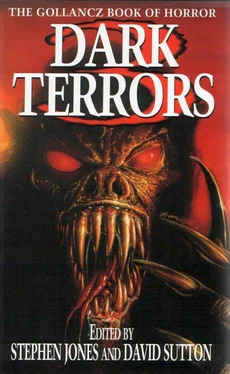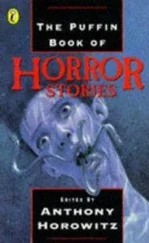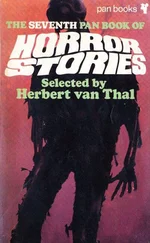Is that why nobody will hear me out? How can they not understand that there may be other places like Warrendown, where monstrous gods older than humanity still hold sway? For a time I thought some children’s books might be trying to hint at these secrets, until I came to wonder whether instead they are traps laid to lure children to such places, and I could no longer bear to do my job. Now I watch and wait, and stay close to lights that will blind the great eyes of the inhabitants of Warrendown, and avoid anywhere that sells vegetables, which I can smell at a hundred yards. Suppose there are others like Crawley, the hybrid spawn of some unspeakable congress, at large in our streets? Suppose they are feeding the unsuspecting mass of humanity some part of the horror I saw at the last under Warrendown?
What sane words can describe it? Partly virescent, partly glaucous — pullulating — internodally stunted — otiose — angiospermous — multifoliate— Nothing can convey the dreadfulness of that final revelation, when I saw how it had overcome the last traces of humanity in its worshippers, who in some lost generation must have descended from imitating the denizens of the underworld to mating with them. For as the living idol unfurled a sluggish portion of itself towards me, Crawley tore off that living member of his brainless god, sinking his teeth into it to gnaw a mouthful before he proffered it, glistening and writhing with hideous life, to me.
* * *
Ramsey Campbell has recently completed a new suspense novel, The Last Voice They Hear. His other novels include The House on Nazareth Hill, The One Safe Place and The Long Lost. On the non-fiction side his latest contribution is a major piece on British film history in Stefan Jaworzyn’s Shock. His published short stories run into the hundreds, and his collections include Waking Nightmares, Strange Things Stranger Places and Alone With the Horrors. Campbell’s short fiction has been included in both previous editions of Dark Terrors and about his contribution to this volume, he recalls: ‘Before learning from Leiber and Nabokov and Graham Greene, I acquired skills by imitating Lovecraft, and I’ve often felt there are a few more Lovecraftian tales in me. (In one of my early stories, “The Insects from Shaggai”, I made such a hash of Lovecraft’s unused idea about alien insects that guilt keeps prompting me to have another go at it.) A couple of years ago I was Guest of Honour at Necronomicon in Massachusetts, and Chaosium, the American publisher of Lovecraftian role-playing games — some of whose players, I hear it rumoured, have to be let out of their attics by their families to play, and then only by a light too dim for a sane eye to discern their outlines — undertook to publish a book in tribute. This was Scott David Aniolowski’s anthology Made in Goatswood, composed of stories set in the Cotswold area I’d made peculiarly my own — and I do mean peculiarly. Scott asked if I would provide an Introduction, but it occurred to me that here was the perfect excuse for me to develop one of the Lovecraftian ideas lurking in the pit I call my brain. I wrote it in time for the book to be launched at the convention, and read it aloud there, to the unstoppable accompaniment of a New Orleans jazz band in the nearby restaurant. Despite that, it was gravely received. When I performed it later for the Preston SF Group, however, some Lovecraftian tittering was audible from Bryan Talbot, most recently famous — deservedly so — as the creator of The Tale of One Bad Rat. Can he have glimpsed some dark secret of my tale?’
Skinned Angels
KATHRYN PTACEK
Jim didn’t want to go into the shop, but his wife insisted. ‘We’re tourists, and we should be doing touristy things,’ she said.
He relented. After all, it was his vacation — their vacation — and they were out to have fun, or at least that was the theory. Poking around in old shops was his wife’s idea of amusement; it wasn’t his, but he wanted to please her. They’d had some problems recently, and this trip to Santa Fe was one of the things they’d thought might start to help.
The bell clanged over the door as Jim pushed the glass door open. Immediately he wrinkled his nose. Old dust, dried herbs, perfumes and spicy incense assaulted his senses, and beneath it was the smell of something he couldn’t quite put his finger on. He wanted to sneeze, but managed to control it.
Bev was already across the room, examining some rugs heaped into mounds along one side of the store. They had a handful of Indian rugs in their house and he hoped she wouldn’t insist that they buy some more. He didn’t know why he resisted everything; it wasn’t as if buying one more rug would break them financially, and he actually liked Indian rugs quite a lot. ‘You’re so negative,’ Bev accused him, and she was right. He was negative, but he couldn’t seem to help it.
No, he amended with a faint smile, he was positive he was negative.
He ambled over to the ramshackle bookcase that all these stores along this little Santa Fe street — hardly more than a burro lane, really — seemed to have and scanned the titles. Most were in Spanish, which he didn’t know despite having lived in New Mexico for over thirty years. He had avoided learning the language, although he didn’t know why because he spoke German and French, and could make himself pretty well understood in Italian. Spanish should have come to him so easily. But he hadn’t wanted to learn it, hadn’t seen the need, despite working with Spanish-speaking men and women ever since he got out of college.
You’re just being stubborn, his mother used to say. And she was right.
Stubborn and negative, he thought, and wondered how anyone stood him.
He took a look around the store and saw some leather goods — boots and saddles mostly — in one section, some bright clothing hanging from a few racks, a chest that looked like it had numerous little perfume bottles on it, and all around the room stood case after case of jewellery.
If they ever outlawed jewellery in Santa Fe, the city would go belly-up, he thought. That’s fairly uncharitable, he realized. He could add that to his long list of growing sins.
The autumn light filtered in through the dirty window and he felt warm standing in front of the bookcase. It was a comfortable feeling, and for a moment he didn’t want to move, didn’t want to do anything, and it was as if he’d gone into another dimension because he couldn’t hear anyone, couldn’t smell anything, not even the too-sweet perfumes and incense. It was just him and the bright sunshine, and—
‘Jimmy, come look at this!’
The sound of his wife’s voice was like the ripping of a membrane, and he shook himself, almost more a shudder. He left the mildewing tomes and headed across the room. At first he couldn’t locate her, then he saw her standing at a counter. She was being waited on by an old man.
He became aware then that there were two girls — excuse me, he chided himself, that was young women these days — standing not far from Bev, pointing at something in the glass case; one was talking while the other giggled. He came up alongside his wife and smiled automatically. If he did anything else, she’d want to know what was wrong, and he would say nothing was wrong, but she wouldn’t believe him, and they’d go back and forth like that until something was the matter.
‘Look, Jimmy, aren’t they great?’ She dangled a pair of silver earrings from her fingers, while the clerk smiled expectantly at him. She was waiting, he knew, for his response. His positive response.
Читать дальше












